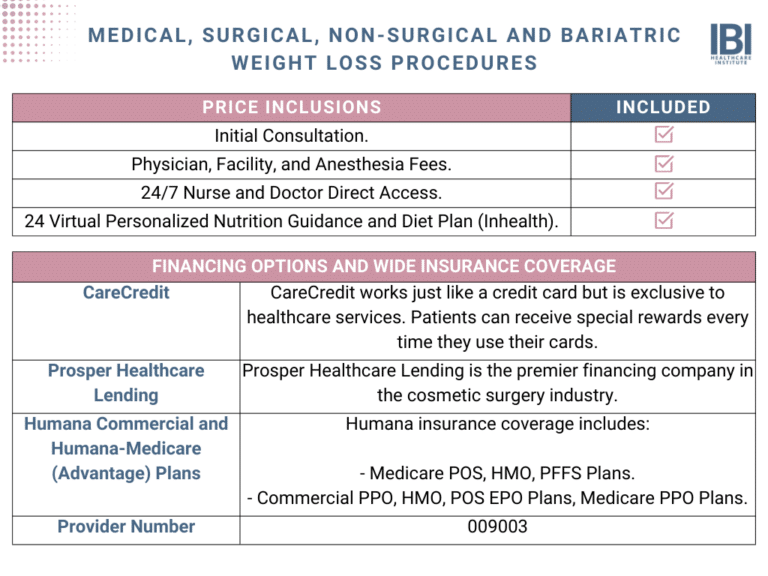Advanced Weight Loss Center
Bariatric surgery, also known as weight loss surgery, refers to a wide range of procedures. That induces weight loss by limiting the amount of food your stomach can hold. Nonetheless, at IBI, we provide the safest and most advanced surgical options to reduce weight and achieve your ideal body. However, to better understand things you may need to know before considering a bariatric procedure. Join our free online bariatric seminar.
Who is a Candidate for Weight Loss Surgery?
Weight loss surgery is a medical procedure only suitable for individuals with serious medical problems linked to heavier body weight. Such as type-2 diabetes and heart disease, and who cannot reduce weight simply through lifestyle changes. Obesity means having excess body fat. Eventually, this leads to significant health problems. Such as heart disease, high blood pressure, osteoarthritis, gallbladder, type-2 diabetes, and mental health problems.
Types of Surgical Weight Loss
Mini Gastric Bypass is a simpler and quicker procedure compared to traditional Gastric Bypass. Additionally, the procedure includes a bypass of the small intestine and potentially can be reversible.
LDS surgery combines restriction and malabsorption for significant weight loss. Particularly beneficial for those with heavier body weight and type 2 diabetes.
SADI combines elements of both traditional gastric bypass and biliopancreatic diversion procedures. Altering the digestive process and limiting calorie absorption.
SASI is an innovative and advanced procedure. It combines elements of sleeve gastrectomy and ileal bypass, providing a comprehensive approach to weight management.
Suitable for individuals who didn’t meet their initial weight loss goals. The revision may involve resizing the pouch, addressing stoma issues, or converting to a different bariatric procedure.
A minimally invasive – advanced endoscopic suturing system addresses gastric bypass surgery complications. It allows for precise revision without the need for additional incisions.
A Gastric Band is a silicone band placed around a portion of the stomach to decrease its size. Then reduce food intake by killing your hunger pangs.
With Gastric Bypass, the stomach’s holding capacity is shortened into a small pouch. The procedure helps individuals to consume less food and absorb even fewer nutrients.
Types of Non-Surgical Weight Loss
The Laparoscopic Sleeve removes the stomach’s outer margin to restrict food intake, killing hunger pangs with just a few calories.
With an Endoscopic Sleeve, sutures are placed within your stomach to seal off parts of your stomach. Finally, reduces the food intake capacity.
The Orbera Balloon is a soft silicone balloon that is placed inside your stomach for 6 months. It helps reduce food intake, giving a feeling of stomach fullness.
Types of Medical Weight Loss
TIRZEPATIDE (MOUNJARO®)
Tirzepatide is a weekly skin injection. Shown favorable effects on managing body weight, making it particularly beneficial for individuals with diabetes and heavier weight.
Semaglutide is a prescription medication for treating type 2 diabetes and heavier body weight. Suitable for individuals looking for pharmacological solutions.
Why Choose IBI Advanced Weight Loss Center?
IBI Healthcare Institute is one of the country’s finest surgical facilities. Equipped with the latest cutting-edge technologies necessary to ensure safe and optimal results. During your consultation, our certified surgical experts patiently discuss your medical history. Likewise, run diagnostic tests, and discuss your goals to recommend the ideal weight loss procedures for your needs.
Furthermore, we curate the ideal treatment plan. Similarly, staying with you through every step of the treatment procedure and beyond. Moreover, ensuring optimal results and recovery. Nevertheless, we help individuals achieve and maintain their dream weight and ideal body.

Cost and Insurance Coverage
Bariatric surgery’s cost depends on several factors, including the surgery clinic’s location and the chosen procedure. The cost of weight loss surgery usually ranges from $15,000 to $50,000, with an average cost of $20,000. However, the procedure essentially pays for itself in the long run. Because comorbidity conditions associated with obesity lead to medical expenses exceeding $10,000 per year.
The average medical cost of patients who have undergone weight loss surgery is around $2,000 per year.
Insurance providers are usually hesitant about paying for bariatric surgery because of the large upfront cost. However, you can increase your chance of getting insurance coverage. If you can produce 6 to 12 months of documented diet history and consultations with nutritionists and psychiatrists. Basically, specific insurance plans may cover the procedure if it’s deemed medically necessary.
At IBI, we consider all your financing options and insurance coverage to help you access the treatment.





